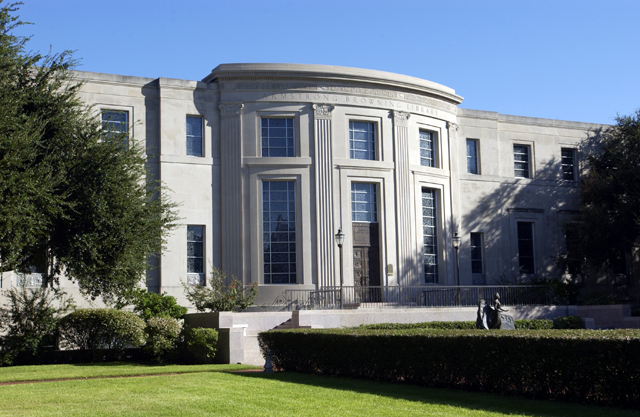Armstrong Browning Library Purchases Rare Items In London

Armstrong Browning Library
by Alan Hunt
Baylor University's Armstrong Browning Library recently added a number of major acquisitions to its world-famous literary holdings through the purchase of 25 lots from the sale of the Halsted B. Vander Poel Collection of English Literature at Christie's in London.
Vander Poel, an American who spent much of his adult life in Italy, assembled one of the world's most extensive collections of rare books, manuscripts, correspondence, paintings and other works of art before his death in 2003. A 1935 Yale graduate, Vander Poel was a World War II veteran who saw distinguished service with the U.S. Navy. During the 1950s, he served with the Office of Defense under President Dwight Eisenhower and was responsible for compiling the first evacuation plan for the White House in case of nuclear attack.
Dr. Stephen Prickett, director of Armstrong Browning Library, said the acquisitions include a 94-page manuscript of Elizabeth Barrett Browning's "Essay on Mind," an early poem from the 1820s which, "despite its title, is a remarkably sophisticated discussion of romantic poetic theory and her poetic creed in the relationship of art to life."
For admirers of Lord Alfred Tennyson's most famous poem, In Memoriam, the purchases include a love-letter to Emily Tennyson - Alfred's sister - from Arthur Hallam, whose untimely death inspired Tennyson to write his series of meditative verses on religious faith, doubt and personal immortality over more than 20 years.
"After the death of Prince Albert, it was Queen Victoria's favorite bedside reading and is widely believed to have led to Tennyson's peerage," Prickett said.
Other lots include John Ruskin's personal copy of his Notes on the Construction of Sheepfolds.
"It is not, as one might expect, a piece on rustic architecture, but an essay on the Church and the role of the clergy, enlivened with a number of humorous illustrations," Prickett said.
He added that the copy of Notes is of particular interest to Armstrong Browning Library since it has many annotations by Ruskin, including a quotation from Elizabeth Barrett Browning's "Casa Guidi Windows."
Also from Ruskin's library is a presentation copy of Dante Gabriel Rossetti's Poems, hand-printed on handmade paper and bound by hand in beautifully tooled leather. Ruskin and Rossetti were both foundation Professors of Art at the London Working Men's College, Prickett said, "but the former had become increasingly irritated by Rossetti's frequent requests for financial aid, and perhaps this splendid volume was a way of justifying such subsidies to the long-suffering Ruskin."
Perhaps Armstrong Browning Library's most spectacular printed purchase is the magnificent Kelmscott edition of Chaucer, a summation of all that the Pre-Raphaelites and the Arts and Crafts Movement stood for. With lavishly detailed designs, the book is described as "a pocket cathedral" by its illustrator, Burne-Jones, and was produced by William Morris entirely by hand at his Kelmscott Press in 1896.
"It is arguably the most beautiful single piece of book production from the 19th century," Prickett said. The edition also is known for its considerable size - 423 x 287 mm or about the size of an attaché case.
Most interesting of all - for its sentimental associations - is Vander Poel's collection of letters tracing the evolution of Robert Browning's second great romance after the death of his wife, Elizabeth Barrett Browning. The collection comprises 29 of his letters to Julia Wedgwood, a great-granddaughter of Josiah Wedgwood, founder of the pottery dynasty, and niece by marriage of Charles Darwin. The correspondence also includes 44 of Wedgwood's letters, and 17 others.
Julia Wedgwood was a distinguished and highly intelligent woman of 30, when she first met the 51-year-old Browning in 1863. Drawn together initially through bereavement - Browning had recently lost his wife, and Wedgwood her brother - their mutual consolations led rapidly to something more.
"In 1865 Wedgwood resolved to break it off (no less than three drafts of this difficult letter are in the collection), either for fear of scandal, or through the realization that she could never come to replace the memory of Elizabeth," Prickett said. "Though the correspondence was later resumed, the old familiarity never returned. None of Browning's many women friends were allowed to forget that in the last resort Elizabeth was the great and only love of his life."
Prickett said these acquisitions and other purchases of books and letters by Charles Kingsley, George MacDonald, John Henry Newman and a number of women poets of the period, such as Eliza Cook, mark the continued expansion of Armstrong Browning Library.
"While never losing its central focus on the Brownings and their circle, and with generous support from many donors, Armstrong Browning Library continues to broaden more and more into a specialist library of Victorian Studies," Prickett said.
Prickett, who joined the Baylor faculty last year, serves as The Margaret Root Brown Chair for Robert Browning and Victorian Studies, and Visiting Professor of English. He can be contacted at (254) 710-3566 or Stephen_Prickett@baylor.edu.
Rita S. Patteson, assistant professor and librarian/curator of manuscripts at Armstrong Browning Library, said the new items are expected to arrive from England in time for display at the May 7 Browning Day program at the library. Browning Day is a celebration of the birthdays of Robert Browning (May 7), Elizabeth Barrett Browning (March 6) and Dr. A.J. Armstrong (March 29), former Baylor English department chair and library founder.